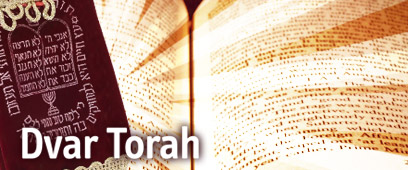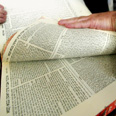

"And Isaac prayed to the Lord for his wife, because she was barren; and the Lord granted his prayer, and Rebecca his wife conceived. The children struggled together within her; and she said, 'If it is thus, why do I live?' So she went to inquire of the Lord. And the Lord said to her, 'Two nations are in your womb, and two peoples, born of you, shall be divided; the one shall be stronger than the other, the elder shall serve the younger.'
"When her days to be delivered were fulfilled, behold, there were twins in her womb. The first came forth red, all his body like a hairy mantle; so they called his name Esau. Afterward his brother came forth, and his hand had taken hold of Esau's heel (aqev); so his name was called Jacob (Ya’aqov)."
"When the time of her delivery came, there were twins in her womb. And when she was in labor, one put out a hand; and the midwife took and bound on his hand a scarlet thread, saying, “This came out first.” But as he drew back his hand, behold, his brother came out; and she said, “What a breach (paretz) you have made for yourself!” Therefore his name was called Peretz. Afterward his brother came out with the scarlet thread upon his hand; and his name was called Zerah."
Both stories relate the origins of names, and each treats of the implied question of who is entitled to be the first born, and enjoy the privileges of primogeniture.
Different stories
In their recent book “That’s Not What the Good Book Says,” Avigdor Shinan and Yair Zakovitch present a commonly held belief: Biblical narratives are designed to deliver messages that the Bible is interested in conveying. Thus, biblical accounts of events may not reflect the original form of the story, and there may have been more than one version of the tale.
The authors believe that, in addition to the biblical account of the birth of Jacob and Esau, there were other versions of the story in ancient Israel, and the original version may have more closely resembled the account of the birth of Peretz and Zerah.
According to the biblical version, Jacob grasped Esau’s heel, thus signifying that he was meant to be the firstborn. This intention is later realized when Esau sells his birthright to Jacob. But in the original, it was Jacob who was born first, after acting deceitfully in Rebecca’s womb, just like Peretz.
According to this view of the story, the source of the name Jacob (Ya’aqov) is not Jacob’s holding Esau’s heel (aqev), but the word aqov, meaning “deceit”. Thus, for example, we find in the Book of Kings (II Kings 10:19): “But Jehu did it with cunning (ve-aqba) in order to destroy the worshippers of Baal.” In other words, Jehu acted deceitfully in order to destroy the worshippers of Baal.
In our parasha, too, after Jacob tricks Isaac, Esau says (Genesis 27:36): “Isn't he rightly named Jacob? He has deceived me (va-yaqeveni) these two times.”
Zakovitch and Shinan argue that the phrase “deceived me these two times,” alludes to the original folktale, no longer preserved in the Bible, in which Jacob deceived Esau at birth, and again when he disguised himself as Esau to obtain Isaac’s blessing.
Zakovitch and Shinan also cite other verses that they believe should be understood as relating to an extra-biblical version of the story of the birth of Jacob and Esau:
The prophet Hosea refers to Jacob when he accuses Israel of falsehood (12:4): “In the womb he deceived (aqav) his brother.”
Jeremiah complains of the dishonesty of the people, saying (9:3): Beware of your friends; do not trust your brothers. For every brother is a deceiver (aqov ya’qov), and every friend a slanderer.” The prophet implies that today’s deceptions are the result of Jacob’s deceiving Esau, when he cheated him in his mother’s womb.
Was Jacob a fraud?
Zakovitch and Shinan bring several additional examples to reinforce the argument that if in addition to the biblical story in which Jacob merely grabs Esau’s heel, there were another version in which he deceives his brother in the womb, then it would be reasonable to conclude that the story of Jacob’s disguising himself to obtain Isaac’s blessing would be part of that same folktale that, unlike the Bible, depicts Jacob as a cheat.
In that light, we can appreciate Zakovitch and Shinan’s explanation that the Bible is careful to ascribe Jacob’s name to his holding his brother’s heel (aqev), and makes no mention that aqev can also allude to deception. After all, the Bible wishes to portray Jacob as a righteous man who was worthy of the birthright and of Isaac’s blessing, rather than as a schemer who acquired them by deception.
It is in this context that Zakovitch and Shinan understand the significance of changing Jacob’s name to Israel, as well as the use of the name Jeshurun to refer to People of Israel in the Book of Deuteronomy.
According to their approach, the original name of the nation – the Children of Jacob or the House of Jacob – means the House of Deception. When the angel says to Jacob, “Your name shall no longer be Jacob, but Israel,” the implication is that you and your children shall no longer be known by a name that signifies deception, but by a name that symbolizes honesty (yosher). Thus, they believe that yashar (straight/honest) is the root of Israel (Yisrael) and Jeshurun (Yeshurun).
Rabbi Dr. Yossi Turner, Senior Lecturer in Jewish Thought and Philosophy at Shechter Institute of Jewish Studies















